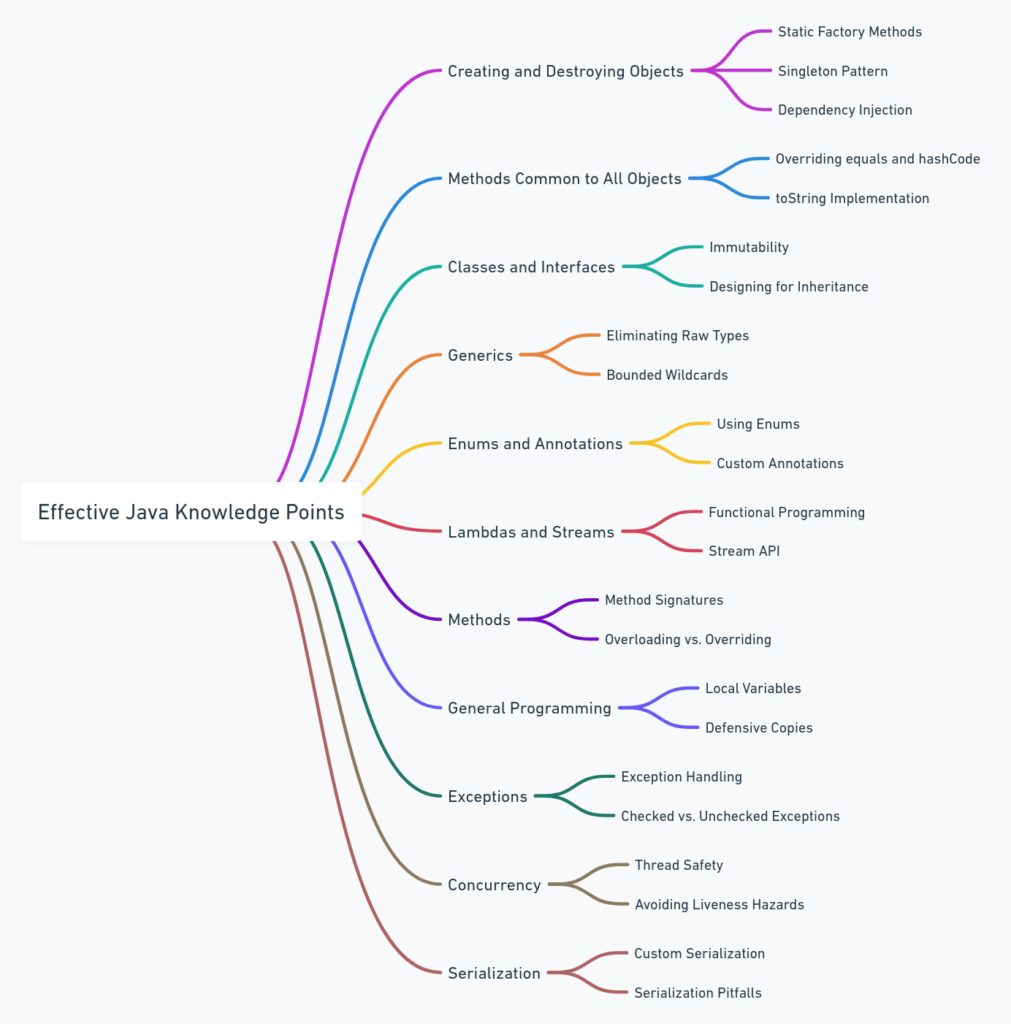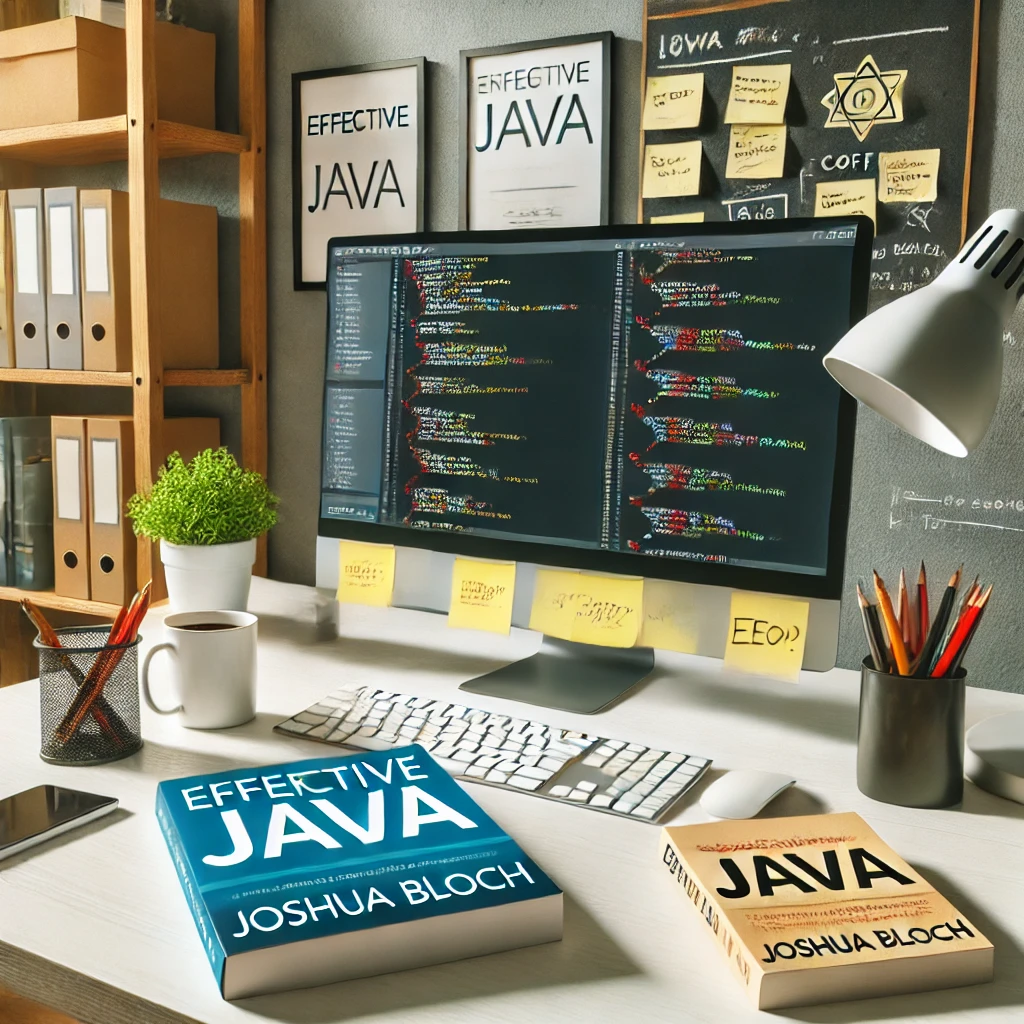In the realm of software engineering, continuous learning and skill enhancement are crucial for career growth. Whether you’re a novice programmer or a seasoned expert, honing your Java skills can set you apart in the competitive tech industry. One book that stands out as a comprehensive guide to mastering Java is “Effective Java” by Joshua Bloch. This blog delves into the contents of the book and explores why it is an invaluable resource for both junior and senior software engineers.
An Overview of “Effective Java”
“Effective Java” is structured around a series of best practices that are essential for writing robust, efficient, and maintainable Java code. The book is divided into several sections, each focusing on different aspects of the language and its usage. Here’s a detailed summary of its content:
Creating and Destroying Objects
- Static Factory Methods vs. Constructors: Bloch explains the advantages of using static factory methods over constructors, such as having meaningful names and the ability to return instances of any subtype.
- Singletons and Noninstantiability: He covers the best practices for implementing singletons and preventing instantiation of utility classes using private constructors.
- Dependency Injection: The importance of dependency injection for promoting loose coupling and easier testing is highlighted.
Example: Instead of using a constructor, use a static factory method:
public static Boolean valueOf(boolean b) {
return b ? Boolean.TRUE : Boolean.FALSE;
}Methods Common to All Objects
- Overriding
equalsandhashCode: The book provides a step-by-step approach to correctly override these methods to ensure object equality and proper functioning in hash-based collections. - Consistent Use of
toString: Guidelines for implementingtoStringto provide useful information about the object state.
Example: A correct implementation of equals and hashCode:
@Override
public boolean equals(Object o) {
if (this == o) return true;
if (!(o instanceof MyClass)) return false;
MyClass myClass = (MyClass) o;
return Objects.equals(id, myClass.id);
}
@Override
public int hashCode() {
return Objects.hash(id);
}
Classes and Interfaces
- Minimizing Mutability: Bloch advocates for immutable objects to increase reliability and simplicity.
- Designing for Inheritance: Best practices for designing classes that are intended for inheritance, such as providing documentation for subclass implementers.
Example: Making a class immutable:
public final class Complex {
private final double re;
private final double im;
private Complex(double re, double im) {
this.re = re;
this.im = im;
}
public double realPart() { return re; }
public double imaginaryPart() { return im; }
public Complex add(Complex c) {
return new Complex(re + c.re, im + c.im);
}
}
Generics
- Eliminating Raw Types: Encourages the use of generics to avoid type errors at runtime.
- Effective Use of Bounded Wildcards: Discusses how to use wildcards to increase API flexibility.
Example: Using bounded wildcards:
public static <T extends Comparable<? super T>> T max(List<? extends T> list) {
Iterator<? extends T> i = list.iterator();
T result = i.next();
while (i.hasNext()) {
T t = i.next();
if (t.compareTo(result) > 0)
result = t;
}
return result;
}
Enums and Annotations
- Power of Enums: Explains how to use enums instead of int constants and the benefits they bring, such as type safety and ability to add methods.
- Creating and Using Annotations: Guidelines for defining custom annotations and using standard ones to improve code quality.
Example: Defining an enum type:
public enum Operation {
PLUS, MINUS, TIMES, DIVIDE;
double apply(double x, double y) {
switch (this) {
case PLUS: return x + y;
case MINUS: return x - y;
case TIMES: return x * y;
case DIVIDE: return x / y;
}
throw new AssertionError("Unknown op: " + this);
}
}
Lambdas and Streams
- Functional Programming in Java: The book explores the use of lambdas and functional interfaces to write more concise and readable code.
- Stream API: How to effectively use streams for processing collections and arrays in a functional style.
Example: Using streams to filter and map a list:
List<String> filtered = list.stream()
.filter(s -> s.startsWith("a"))
.map(String::toUpperCase)
.collect(Collectors.toList());
Methods
- Designing Method Signatures: Advice on choosing method names, parameters, and return types to make APIs intuitive.
- Overloading vs. Overriding: Best practices for method overloading and when to prefer composition over inheritance.
Example: Effective use of varargs:
static int sum(int... args) {
int sum = 0;
for (int arg : args) {
sum += arg;
}
return sum;
}
General Programming
- Local Variables and Control Structures: Guidelines for declaring local variables and using control structures effectively.
- Defensive Copies: Making defensive copies of mutable parameters to maintain class invariants.
Example: Creating defensive copies:
public final class Period {
private final Date start;
private final Date end;
public Period(Date start, Date end) {
this.start = new Date(start.getTime());
this.end = new Date(end.getTime());
}
public Date start() {
return new Date(start.getTime());
}
public Date end() {
return new Date(end.getTime());
}
}
Exceptions
- Using Exceptions Judiciously: Bloch emphasizes using exceptions for exceptional conditions only and not for control flow.
- Best Practices for Throwing Exceptions: Clear advice on how to throw, document, and catch exceptions.
Example: Using checked exceptions for recoverable conditions:
public class MyException extends Exception {
public MyException(String message) {
super(message);
}
}
Concurrency
- Thread Safety: Techniques for writing thread-safe classes, such as synchronization and concurrent collections.
- Avoiding Liveness Hazards: Discusses deadlocks, livelocks, and how to design for responsiveness.
Example: Using ConcurrentHashMap:
Map<String, Integer> map = new ConcurrentHashMap<>();
Serialization
- Custom Serialization: How to customize the default serialization mechanism to improve performance and security.
- Avoiding Serialization Pitfalls: Tips to avoid common issues with Java serialization.
Example: Implementing custom serialization:
private void writeObject(ObjectOutputStream s) throws IOException {
s.defaultWriteObject();
s.writeInt(size);
}
private void readObject(ObjectInputStream s) throws IOException, ClassNotFoundException {
s.defaultReadObject();
size = s.readInt();
}
Personal Experience with “Effective Java”
From my personal experience, “Effective Java” has been a game-changer in my approach to Java programming. As a junior engineer, it helped me build a solid foundation and understand the nuances of writing clean and efficient code. The examples and practical advice made it easier to grasp complex concepts and apply them in real-world scenarios.
As I transitioned to a more senior role, the book continued to be a valuable resource. It deepened my understanding of advanced topics like concurrency and serialization. The insights into API design and best practices for writing maintainable code have been instrumental in mentoring junior developers and conducting thorough code reviews.
Why “Effective Java” is Essential for Your Career
For Junior Engineers:
- Foundation Building: “Effective Java” helps build a strong foundation in Java programming. It introduces best practices early on, which can prevent the formation of bad coding habits.
- Practical Examples: The book is rich with practical examples and explanations that simplify complex concepts, making it easier for beginners to grasp.
- Enhancing Problem-Solving Skills: By following the principles laid out in the book, junior engineers can develop better problem-solving skills and learn to write clean, efficient code.
For Senior Engineers:
- Deepening Knowledge: Even seasoned professionals will find value in the advanced topics and nuanced insights that “Effective Java” offers. It’s a great way to refresh and deepen your existing knowledge.
- Staying Updated: The book covers modern features of Java, including lambdas and streams, ensuring that senior engineers stay current with the latest advancements in the language.
- Mentoring and Code Reviews: Senior engineers often take on mentoring roles. The principles from “Effective Java” provide a solid basis for conducting code reviews and guiding junior team members.
- Architectural Decisions: The book’s discussions on class and interface design, concurrency, and performance can aid in making informed architectural decisions.
Mind Map: Knowledge Points in “Effective Java”
I have created a mind map to visually organize the key knowledge points covered in “Effective Java”. This will help in understanding the breadth and depth of the topics discussed in the book.

Conclusion
“Effective Java” by Joshua Bloch is more than just a book; it’s a manual for excellence in Java programming. Its comprehensive coverage of best practices makes it a must-read for both junior and senior software engineers. By incorporating the principles from this book, you can enhance your coding skills, contribute to higher quality projects, and advance your career in software engineering. Whether you’re looking to solidify your fundamentals or refine your advanced skills, “Effective Java” is the guide you need on your journey to becoming an exceptional Java developer.

